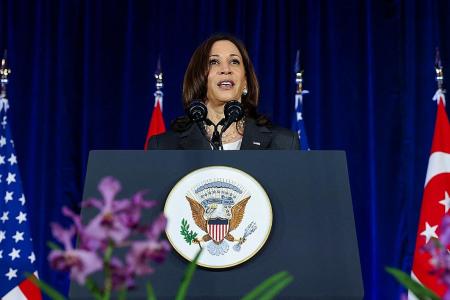US offers to host Apec forum in 2023 to engage region
V-P Harris' announcement signals US recognition of group's role in bringing economies together
The United States has offered to host the Asia-Pacific Economic Cooperation (Apec) forum in 2023, recognising the group's role in bringing together dynamic economies on both sides of the Pacific.
Announcing this in a speech at Gardens by the Bay yesterday, US Vice-President Kamala Harris said: "Through Apec, the US has long worked with our partners in Asia and Latin America to build an interconnected region that advances our collective economic prosperity."
This vision is critical to the US' optimistic outlook for its partnership with the region, she said.
The offer to host the 21-member grouping - which includes Australia, China, Indonesia, Japan, Russia, Singapore and Vietnam and whose chairmanship is rotated annually - signals the importance the US places on the region and on multilateral cooperation, Ms Harris' senior adviser Symone Sanders said.
New Zealand is Apec chair this year, and Thailand, next year.
The US has chaired Apec twice before - in 1993, then President Bill Clinton hosted the first Apec leaders' summit in Seattle; and in 2011, then President Barack Obama hosted Apec leaders in Honolulu.
GROWING ECONOMY
In her speech, Ms Harris said the US economy is growing faster than it has in nearly 40 years.
"We believe that our growth should not stop at the water's edge, but it can and will also benefit our partners. Our economy shares so much with South-east Asia, from supply chains to a steady flow of two-way trade," she said, noting that South-east Asia represents the US' fourth-largest export market, and trade with the region supports more than 600,000 US jobs.
The United States' partnerships will be grounded in openness and inclusiveness, and it will pursue a free and open Indo-Pacific that promotes its interests and those of its partners and allies, she said.
"In addition to deepening close bilateral relations, we will also work multilaterally through longstanding institutions like Asean, which remains central to this region's architecture. We will also work with new results-oriented groups like the Quad and the US-Mekong partnership," she said.
"I believe that when the history of the 21st century is written, much of it will be centred right here in the Indo-Pacific.
"There should be no doubt: We have enduring interests in this region, and we have enduring commitments as well."
The Quad, or Quadrilateral Security Dialogue, involves the US, Japan, Australia and India; while the Mekong-US Partnership seeks to boost US cooperation with Cambodia, Laos, Myanmar, Thailand and Vietnam.
She also stressed that the United States' engagement of the region is not directed against any one country, nor is it designed to make anyone choose between countries.
The US vision is one of peace and stability and commitment to the international rules-based order, and it recognises that countries' common interests are not zero-sum, she said.
Following the speech, which was hosted by the Lee Kuan Yew School of Public Policy and the US Embassy in Singapore, Ms Harris discussed supply-chain resilience and cooperation at a session with Trade and Industry Minister Gan Kim Yong and business leaders.
Ms Harris left for Vietnam last night for the second leg of her trip.
Get The New Paper on your phone with the free TNP app. Download from the Apple App Store or Google Play Store now



